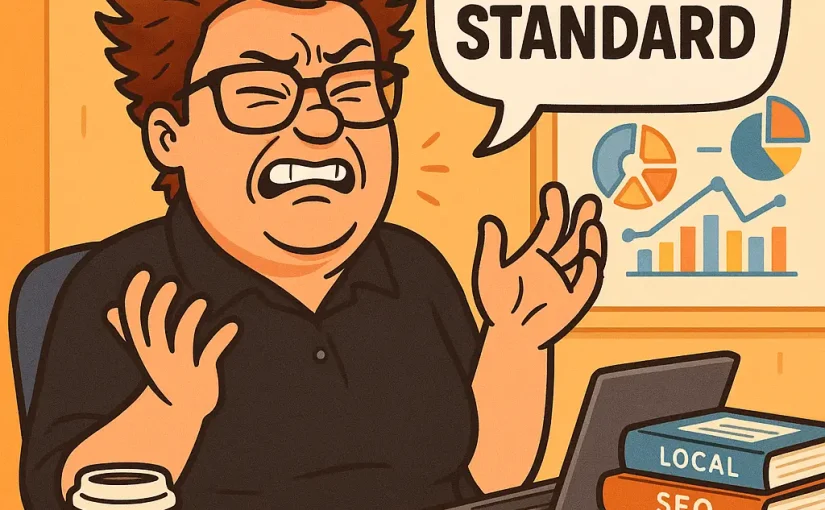Why I Find the Term “Industry Standard” So Cringe (And You Should Too)

Why Hearing “Industry Standard” Drives Me Nuts
After spending over two decades in the digital marketing world, helping hundreds of local contractors grow their businesses, there’s one phrase that always makes me cringe: “Industry Standard.”
I hear it all the time — from web designers, SEO providers, and even software companies trying to justify their processes.
But after years of real-world experience, I can tell you:
“Industry Standard” is often just a buzzword.
And in the fast-moving world of digital marketing, it can be downright dangerous if you blindly follow it.
Let me explain why.
1. The Internet Changes Too Fast for “Standards” to Matter
In the world of construction or manufacturing, standards are built over decades. They are tested, proven, and used to ensure safety and quality.
But the internet?
It’s a totally different animal.
- Technologies change every few months.
- Google updates its algorithm hundreds of times a year.
- AI has completely changed how people find businesses — almost overnight.
What was considered a “best practice” two years ago could get your site penalized today.
And what’s “standard” in web design this month might be obsolete next month.
There’s no permanent playbook.
The rules are always changing. If you’re following last year’s “standards,” you’re already falling behind.

2. There’s No True Agreement on What “Industry Standard” Even Means
In industries like aviation or healthcare, there are formal boards and regulatory bodies that set clear standards.
But in web design and SEO? Not so much.
Everyone has their own idea of what “standard” is.
- One agency says you need five pages minimum.
- Another says you need fifteen.
- One SEO “expert” says you should blog weekly.
- Another says monthly blogs are enough.
Who’s right?
The truth is, it depends on your market, your services, and your goals.
“Industry standard” isn’t a universal rulebook — it’s often just a personal opinion. And unfortunately, many companies hide behind that phrase instead of offering real strategy.
3. “Industry Standard” Is Often Just a Marketing Gimmick
Let’s be real:
Saying something is “industry standard” sounds good. It gives people confidence. It makes a service or product feel official, safe, and trustworthy.
But many times, it’s just being used to:
- Gloss over weaknesses.
- Avoid explaining details.
- Oversell outdated practices.
When someone tells you something is “industry standard,” ask them:
“Whose standard? When was it set? How does it actually help my business today?”
You’ll be surprised how often the answer is vague — if you get a real answer at all.
4. There’s a Huge Gap Between Theory and Real-World Results
Another reason I don’t put much faith in “industry standards” is because I’ve seen firsthand how different theory and real life are.
In theory:
- A certain layout “should” perform better.
- A certain SEO method “should” boost rankings.
In reality:
- Your target customers might behave totally differently.
- Your local market might react in ways no “standard” predicted.
- What worked for a national brand might completely flop for a small-town fence company.
The internet is about real people, not theories.
And if you’re not constantly testing, adjusting, and learning, you’re going to lose out — no matter how many “standards” you followed.
5. Innovation Beats Standardization Every Time
The companies that win online aren’t the ones following the same old rules.
They’re the ones pushing boundaries, trying new ideas, and moving faster than the so-called “standards.”
- They adjust when Google rolls out a new AI update.
- They rebuild when better technology becomes available.
- They listen to their customers, not just their competitors.
At GBC Digital Marketing, that’s exactly what we help contractors do — adapt, innovate, and win in today’s online landscape.
Following the crowd never made anyone a leader.
Final Thoughts: Don’t Settle for “Standard”
If you take anything away from this article, I hope it’s this:
“Industry Standard” shouldn’t be the goal.
Growth should be the goal. Results should be the goal.
You don’t need a website or SEO plan that’s “standard.”
You need one that’s strategic, custom, and built for how the internet works right now — and where it’s heading next.
If you’re ready to ditch outdated advice and get a real plan for growing your business, I’m here to help.
Let’s build something better — together.






